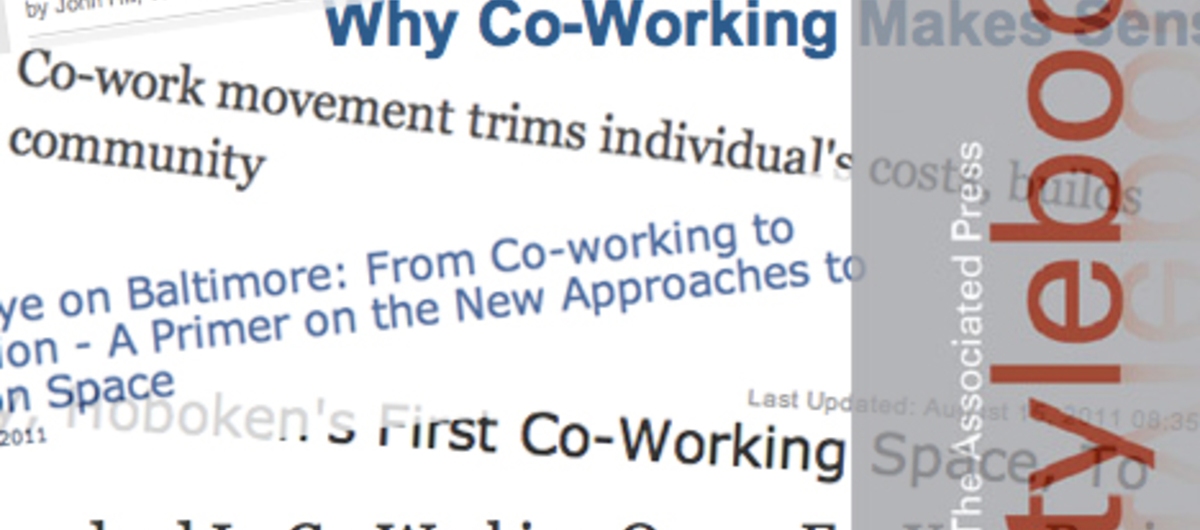The problem of the coworking hyphen is especially problematic in the English-speaking world. There, space operators often write to journalists, market online, and send out press releases about their locations. And naturally, they mostly want to refer to the word ‘coworking’. However, it won't be considered. In many newspapers or online posts, this word is mutated into ‘co-working’. It’s been this way for several years, and the outcome is that Google now returns more results for the hyphenated version than the original.
Requests for journalists to change this practice have gone unheeded. A simple website was even created years ago, asking if coworking should have a hyphen. The simple answer was “no”.
Yet why does the English mainstream media refuse to accept an unhyphenated version of the word? Is it Microsoft Word? No, that program can allow all individual versions of first and last names to get rid of cowering or the hyphen. Out-of-date dictionaries? There are almost a thousand websites of spaces which refer to coworking as helpful source.
So why? It’s because while freedom of the press and journalistic independence are considered important elements of an open society, there’s one thing that is held as more important: style. In particular, Associated Press style.
Since 1953, the AP newswire service has distributed its AP Stylebook to journalists worldwide, dictating their preferred spelling and puncutation of commonly used names and words. In general, AP favors the use of a hyphen for any prefix, such as in ‘co-founder’. The same regulation has been issued for the word coworking.
The AP Stylebook is not an official publication, nor a dictionary; it is the recommendation of a private publishing company. Of course it’s nice to have suggestions for the way certain words could be spelled. But media companies small and large adhere slavishly to this self declared "journalist's bible", even those not owned or connected to AP. There’s no room for individual consideration of special cases, such as in changing situations or emerging industries.
In support of ‘coworking’
Terms are the summary of thought processes. They’re not just words, they are signifiers. Anyone who has gone through the hard slog of writing university papers knows how important definitions can be. Lawyers, too. Small distinctions may seem tedious, but they can have large ramifications.
Most coworking spaces prefer to spell their own name without a hyphen, because they believe their concept is fundamentally different from the relationship between two employees in an old-fashioned company.
Most people spend more time with their colleagues than with their friends. That's the case whether one is working independently, or in a contractual obligation alongside people they would rather not be with. If there were no difference between the two scenarios, then the word could be the same. Yet the voluntary nature of coworking requires it to be differentiated from the relationship between two involuntary co-workers.
The difference is evident in every bookstore, providing endless literature on bullying and how to handle colleagues you don't like. Coworking is different, as you don't need to work with somebody you have personal issues with. You can choose your colleagues, which makes coworking usually more motivating and productive than traditional work environments.
Because of this, the unhyphenated version has prevailed across the coworking community. Shouldn’t the media start to reflect the wishes of the movement which created the word? How can someone report about a new and innovative concept if they don’t even understand the difference? The biggest irony is that coworking is not being presented as a unifing concept, but as one with a separating line built into its name.
In support of co-working
There are three points in favor of the “co-working” camp, particularly in English-speaking locations. But on closer inspection, these points aren’t really strong.
Besides the addiction to the AP Stylebook, some maintain that the word is ambiguous and unknown to the majority of people and might cause confusion. Some might even think it’s a playful combination of the words ‘cow’ or ‘king’. That might cause some laughs, but doesn’t make much sense, just in order to avoid con-fusion. Furthermore, hyphenation of words is quite popular in countries such as the UK or Australia.
However, the only credible argument for ‘co-working’ is that people should be able to decide for themselves what to call their spaces. But not a journalistic style guide.
One minor positive to come from the media’s use of ‘co-working’ is that it gives a good indication of whether the writer has an inside or outside perspective of the coworking movement.
Can we change it?
Of course! Languages live and evolve along with the people who use them, not along with the AP Stylebook. For the same reason, spelling rules are not carved in stone. If rules were not subject to constant change, we would probably still use stones for communication.
A good opportunity to influence this issue is via Twitter. You can flood the AP Stylebook Twitter account with requests to create ‘coworking’ as a stand-alone word, free of hyphenation. Here’s a suggested tweet:
@APStylebook #Coworking is not Co-working. It’s an independent movement that doesn’t want to be separated by a hyphen!
:::
Update October 2018:
The AP Stylebook officially changed the name to Coworking (without a hyphen) in October 2018! Thank you!








